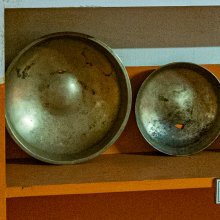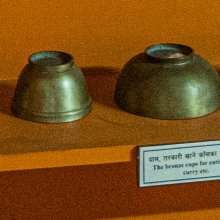Eating: 2 definitions
Introduction:
Eating means something in Hinduism, Sanskrit. If you want to know the exact meaning, history, etymology or English translation of this term then check out the descriptions on this page. Add your comment or reference to a book if you want to contribute to this summary article.
Images (photo gallery)
In Hinduism
Natyashastra (theatrics and dramaturgy)
Source: Shodhganga: Elements of Art and Architecture in the Trtiyakhanda of the Visnudharmottarapurana (natya)(The act of) Eating is associated with Mukula-hasta: one of the twenty-two Single-hand Gestures (in Indian Dramas) (known as asaṃyuktahastas), according to the Viṣṇudharmottarapurāṇa, an ancient Sanskrit text which (being encyclopedic in nature) deals with a variety of cultural topics such as arts, architecture, music, grammar and astronomy.—The Viṣṇudharmottarapurāṇa suggests that the tips of all fingers of the hand should be joined together to make this posture. When the tips of all fingers are joined together, it makes a shape of a blooming bud. [...] In the Abhinayadarpaṇa, the mukula-hasta posture is suggested to be used to denote flowers like water lily and the flower of kadalī i.e., banana. It says that, the holding of five arrows by Kāmadeva and a signet or a seal are also identified through this hand posture. The action of eating is also shown with this hand posture.
Source: Shodhganga: Literary estimate of mudraraksasaEating is denoted by the Sanskrit term Bhojana, and should be avoided on a stage (where a dramatic play is performed).—A Nāṭaka should contain pañcasandhis which indicate five successive stages of the drama. This criterion also is present in the Mudrārākṣasa. [...] In the Sāhityadarpaṇa, Viśvanātha gives a list of certain actions which should not be presented on the stage. These are [e.g., Bhojana (eating)] [...].

Natyashastra (नाट्यशास्त्र, nāṭyaśāstra) refers to both the ancient Indian tradition (shastra) of performing arts, (natya—theatrics, drama, dance, music), as well as the name of a Sanskrit work dealing with these subjects. It also teaches the rules for composing Dramatic plays (nataka), construction and performance of Theater, and Poetic works (kavya).
See also (Relevant definitions)
Ends with: Beating, Heating, Measure In Eating, Meat Eating, Sweating.
Full-text (+1900): Bhakshana, Bhojana, Sahabhojana, Jagdhi, Valbhana, Asana, Pratyavasana, Atyashana, Adin, Abhyavahara, Adhyashana, Amishashin, Grasana, Bhukti, Khadana, Shashkula, Shushkala, Annada, Ekabhukta, Sambhoga.
Relevant text
Search found 363 books and stories containing Eating; (plurals include: Eatings). You can also click to the full overview containing English textual excerpts. Below are direct links for the most relevant articles:
Manusmriti with the Commentary of Medhatithi (by Ganganatha Jha)
Verse 5.20 < [Section III - Penalty for eating Forbidden Food]
Verse 5.19 < [Section III - Penalty for eating Forbidden Food]
Verse 4.43 < [Section IX - Personal Cleanliness]
Vakyapadiya of Bhartrihari (by K. A. Subramania Iyer)
Verse 3.9.82-84 < [Book 3 - Pada-kāṇḍa (9): Kāla-samuddeśa (On Time)]
Verse 3.7.87 < [Book 3 - Pada-kāṇḍa (7): Sādhana-samuddeśa (On the Means)]
Verse 2.372 < [Book 2 - Vākya-kāṇḍa]
Vinaya Pitaka (4): Parivara (by I. B. Horner)
Monks’ Analysis: on How Many Offences? (Pātidesanīya) < [1.2. Monks’ Analysis: on How Many Offences?]
Monks’ Analysis: on the Laying-Down-Where (Pātidesanīya) < [1.1. Monks’ Analysis: on the Laying-Down-Where]
Monks’ Analysis: on How Many Offences? (Sekhiya) < [1.2. Monks’ Analysis: on How Many Offences?]
Lankavatara Sutra (by Daisetz Teitaro Suzuki)
The Tattvasangraha [with commentary] (by Ganganatha Jha)
Verse 1593-1598 < [Chapter 19c - (C) On presumption (arthāpatti)]
Verse 1624 < [Chapter 19c - (C) On presumption (arthāpatti)]
Verse 1020 < [Chapter 16 - Examination of the Import of Words]
The Padma Purana (by N.A. Deshpande)
Chapter 21 - Restrictions While Observing the Kārtika Vow < [Section 4 - Brahma-khaṇḍa (Section on Brahman)]
Chapter 19 - A Description of Śrīśaila < [Section 6 - Uttara-Khaṇḍa (Concluding Section)]
Chapter 18 - A Miraculous Happening < [Section 5 - Pātāla-Khaṇḍa (Section on the Nether World)]
Related products
(+3 more products available)








